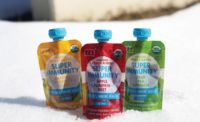Market Growth for Natural, Clean Label Products
Natural, organic and “free-from” products join the clean label mainstream market

Last year, organic claims featured in more than 50% of new baby/toddler foods, says Innova Market Insights.

While organic claims were used on 23% of launches overall in 2015, this rises to 29% in juices/juice drinks and to a massive 45%-plus in iced tea, says Innova Market Insights.

Cereals, bars among the most active new product categories with organic and other healthy claims.

Dannon pledge includes section dedicated to ingredient sourcing, “naturality” and wholesomeness.




It’s been nearly 10 years since Innova Market Insights identified interest in natural and organic options as among its top trends. Today, despite concerns over the definition and use of the term “natural” in some quarters, there’s been continued growth in products marketed on natural or clean label platforms.
Nearly 25% of total global new product launches recorded by Innova Market Insights in 2015 used one or more claims relating to “natural,” organic certification or freedom from additives and preservatives.
Those new product claims are up from fewer than 20% during 2013 and 17% in 2011. Meanwhile, these claims were even more popular in the US during 2015, with more than 31% of new products making one reference or another.
Interest in organic products has risen steadily in recent years, with nearly 9% of global 2015 food and drinks launches recorded by Innova Market Insights positioned on an organic platform, rising to 11.5% in the US. The global organic foods market is now valued at over US$80 billion a year, led by the US with a market of over $35 billion, although estimates vary markedly according to source and definition (particularly as to whether natural foods also are included).
The most significant categories for organic launches in the US are soft drinks with 11% of the 2015 total, sauces/seasonings with 10%, cereals with just under 9% and snacks with just over 8%. In terms of importance to their sector, however, it is baby/toddler foods that lead, with over 53% of 2015 launches using an organic positioning, ahead of cereals, where 26.5% of introductions were organic, soft drinks with just under 23%, hot drinks with just over 21% and fruit and vegetables with over 20%.
Cereals, Bars, Snacks
Innova Market Insights divides the cereals category into two main areas: breakfast cereals and cereal/energy bars. Cereal/energy bar launches just outstripped breakfast cereals with 51.5% of 2015 introductions using a natural and/or organic claim. Despite concerns over amounts of sugar in some products, both sub-categories have a fairly healthy image and Innova finds a relatively high number of health claims used.
Clean label concerns have been a key focus in recent years. Nearly half of all launches used one or more claims relating to naturalness, freedom from additives and preservatives and organic certification in 2015, rising to nearly 52% for cereal/energy bars. Organic claims play a significant role in this, used on just over 27% of cereal/energy bar introductions and just under 26% of breakfast cereals.
The cereal/energy bars sub-category encompasses a wide range of products, including granola or muesli bars and breakfast bars, as well as nutrition, energy and performance bars. With rising levels of competition, however, many products now seek points of difference by combining features and blurring definitions. A wide range of products now use organic claims, including both specialist and more mainstream lines.
New product activity abounds. Spring 2015 saw Clif Bar & Company, Emeryville, Calif., introduce an entirely new seven-item line of CLIF Organic Trail Mix Bars. Flavors include Coconut Almond Peanut, Cranberry Almond, Dark Chocolate Almond Sea Salt, Dark Chocolate Cherry Almond, Dark Chocolate Peanut Butter, Dark Chocolate Pomegranate Raspberry, and Wild Blueberry Almond.
There also are smaller active players like GoMacro Inc. This Viola, Wis., plant-based foods company specializes in products that are USDA Certified organic, Non-GMO Project Verified, vegan certified, kosher certified, gluten-free certified and soy-free. After an initial three-item launch of new GoMacro Thrive bars in spring 2015, GoMacro came back this year with a repackaged, expanded line of Thrive bars including Caramel Coconut, Chocolate Peanut Butter Chip, Blueberry Lavender, Ginger Lemon, and Almond Apricot varieties.
Another interesting introduction comes from Manitoba Harvest Hemp Foods, Winnipeg, which created a Hemp Heart Bar extension to its range of hemp-based products. The new bar features vegan and organic claims and touts high levels of omega 3 fatty acids and protein.
In the breakfast cereals market, granola continues to be a key growth area and one that has seen ongoing activity in organic options—both from branded producers and retailers. Specialist organic brands such as Cascadian Farm and Nature’s Path are being joined by retailer’s private label healthy and clean-label offerings. These include Aldi’s Simply Nature and Target’s Simply Balanced lines, which both include cereal products.
The snacks sector is closely related to the cereal bars market. In fact, both target convenient meal replacement or in-between meal solutions for eating on the go. Organic claims were used for 14.5% of US snack launches in 2015, rising to more than 30% for fruit-based snacks and falling to single figures for finger foods/hors d’oeuvres.
Snack nuts and seeds sit around the average figure of 14.5%, just ahead of savory/salty snacks with just over 13%. Just under 11% of meat snacks launches featured organic claims in 2015, but there was some interesting activity, including Organic Prairie’s Mighty Bar, introduced as America’s first 100% grass-fed organic beef snack. Also marketed as high in protein and gluten- and nut-free, there were two varieties debuting: Uncured Bacon & Apple and Cranberry & Sunflower Seed.
Juices, Teas
Organic options also have a relatively high penetration level in the soft drinks category, where health perceptions already are fairly high, particularly for beverages containing fruit and tea. While organic claims were used on 23% of launches overall in 2015, this rises to 29% in juices/juice drinks and to a massive 45%-plus in iced tea.
Clean label claims are generally relatively high in soft drinks, with more than 48% of launches carrying one or more claims relating to naturalness, freedom from additives and preservatives or organic certification. Organic claims feature relatively strongly in this, with total numbers well ahead of those for natural claims (15% penetration) and only slightly behind those for no additives/preservatives (just under 24%).
Ongoing concern about soft drink sugar levels has boosted interest in the use of natural sweeteners, such as stevia. Products also are being formulated with organic stevia leaf. It was one of the featured ingredients in Loft Tea’s new React, Recharge and Renew tea drinks. Likewise, Honest Tea reformulated its Honest Fizz line of zero-calorie soft drinks with organic stevia and now the offerings—including a new Ginger Ale variety—are entirely organic.
Use of organic ingredients in juices and juice drinks has spread from more common fruit varieties to the more unusual. Other 2015 launches included an organic Beet Juice from Love Beets; a calamansi citrus juice drink with organic cane sugar and organic honey from Vita Mansi; and a range of fruit drinks based on açai from Sambazon. Varieties include Açai Berry, Strawberry Lemon & Açai and Pineapple Coconut & Açai.
Other more unusual ingredients featuring in organic drinks included lettuce in the organic tea drinks from Complex Beverage, Tampa, Fla.; and turmeric in the Orange Turmeric Juice line from Uncle Matt’s Organic. The ancient grain chia also continued to find favor as the Mamma Chia range of chia-branded food and drinks was extended with drinks featuring organic chia and greens. The drinks combine chia seeds with green vegetables such as kale, spinach, broccoli, spirulina, barley grass and wheat grass. With names such as Joyful Greens, Grateful Greens, Love Greens and Soulful Greens, all the drinks are non-GMO, gluten-free, vegan and kosher, as well as organic.
Dairy Developments
Dairy is another important category where organic new products have a high profile. Innova Market Insights found that 12.5% of 2015 new dairy product launches were positioned on an organic platform. Yogurt had the largest number of organic launches, with 33% of the total, ahead of cheese with 19%. The share of organic lines in cheese introductions was relatively low, however, at about 6%, compared with just under 16% for yogurt and just over 14% for milk and milk drinks.
There are some very strong and well-established organic brands in the dairy market running alongside newer entrants and organic options under mainstream umbrellas. There are two organic brands in the top 10 suppliers to the milk market through multiple retailers, for example. Horizon Organic (Whitewave Foods) is the leading branded player in the private-label dominated sector overall, while Organic Valley takes eighth place in low-fat milk and ninth in whole milk.
While the overall milk market is in decline, the relatively small whole milk sub-category has seen a stronger performance in recent years, with volume and value increases in 2015. Both Horizon Organic and Organic Valley saw particularly good growth in their branded whole milk sales, with double-digit volume and value increases for both brands resulting in them strongly outperforming the category as a whole.
Horizon Organic and Organic Valley also have been extending their product lines. New offerings have include with grass-fed varieties including drinking milks, but also grass-fed organic milk ingredients in butter, cheese and yogurt. Other new offerings have included lactose-free lines, protein shakes, hand-held milk-and-fruit pouches and snacking cheese.
Last year saw Organic Valley introduce what it claimed was the US’ first organic adult cheese snacks. New Snack Sticks came in Medium Cheddar and Pepper Jack flavors and are made with organic, non-GMO milk from pasture-raised cows. For its part, Horizon Organic introduced its Shapes cheese bites in Cheddar and Colby flavors. Horizon Organic also has extended its brand further into snacks with a range including fruit snacks and crackers.
Organic yogurt pioneer Stonyfield Farms (now part of the Danone group), also has extended its organic range. It targeted rising interest in whole milk with its 2015 introduction of Oh my Yog!, a whole milk triple-layered yogurt with a layer of fruit on the bottom, honey-sweetened whole milk yogurt in the middle and cream on top. Stonyfield followed this in 2016 with a range of whole milk Organic 100% Grassfed Yogurts in Plain, Vanilla, Strawberry and Blueberry varieties.
It’s clear that clean labeling has moved on beyond being a trend and is now regarded as more or less standard in the food industry, with consumers demanding shorter and more recognizable ingredients lists and manufacturers responding by increasingly highlighting the naturalness and origins of their products.
This interest in naturalness has kept organic claims in the spotlight, although rising levels of competition mean that organic claims alone may not now be enough. Many companies are focusing on additional benefits including local ingredients and sourcing, additive- and GM-free formulations, and unusual and premium-style recipes and flavors, including the use of seasonal and limited edition lines.
Originally appeared in the June, 2016 issue of Prepared Foods as Clearly Growing.
Looking for a reprint of this article?
From high-res PDFs to custom plaques, order your copy today!










